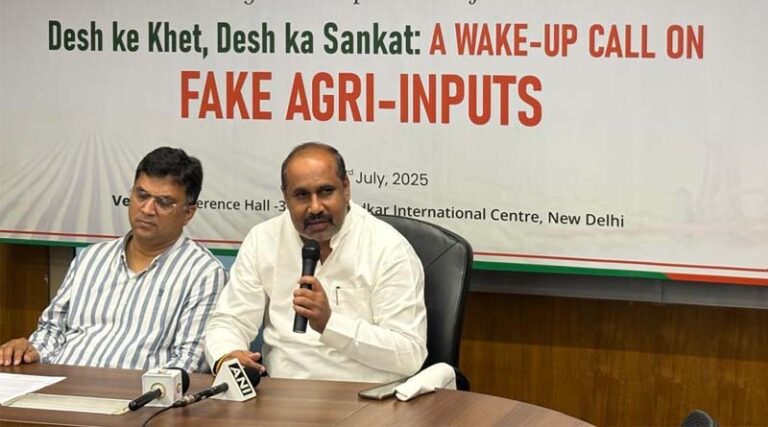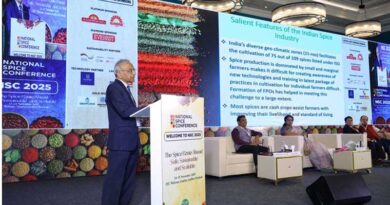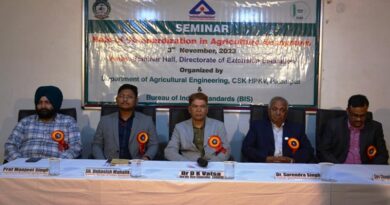
Seizure of 1 Lakh Fake Fertilizer Bags Sparks National Concern Among Indian Farmers
23 July 2025, New Delhi: The Rashtriya Kisan Progressive Association (RKPA) has raised serious concerns over a rapidly escalating crisis involving the distribution of counterfeit agricultural inputs across India. In a press conference attended by farmer leaders, policy experts, and grassroots representatives, the association described the issue as “unprecedented in scale and dangerously systemic,” warning that if immediate action is not taken, the consequences will extend far beyond the fields—threatening national food security, farmer livelihoods, ecological stability, and internal security.
The event was led by Dharmendra Malik, Rashtriya Pravakta of BKU (Non-Political) and Binod Anand, National President of RKPA, both of whom are spearheading a campaign to bring nationwide attention and regulatory action to what they call a “silent emergency in Indian agriculture.”
A Coordinated Network of Counterfeiters Exploiting the System
India is currently witnessing the rise of a highly organized and well-funded network that specializes in the production and distribution of counterfeit agri-inputs such as seeds, fertilizers, pesticides, and farm equipment. These networks have been exploiting weak enforcement mechanisms, regulatory loopholes, and seasonal demand surges to infiltrate rural markets with fake products. The problem intensifies just before the Kharif and Rabi cropping seasons when farmers are most dependent on timely and quality inputs.
A recent example underscores the scale of the crisis. On June 25, 2025, over one lakh fake fertilizer bags were seized in Hapur, Uttar Pradesh. These counterfeit products were allegedly intended for distribution across 22 districts in western Uttar Pradesh, including major agricultural hubs such as Meerut, Ghaziabad, Agra, and Muzaffarnagar. This seizure, while significant, may represent only a fraction of the total volume of fake inputs circulating in Indian agriculture.
Farmers at Risk: Financial, Ecological, and Psychological Toll
Farmers attending the RKPA press event shared stories of devastating losses. Many recounted incidents where their crops failed entirely due to the use of fake seeds or mislabelled pesticides. These inputs are often purchased on credit or with borrowed money, and the resulting crop failures not only lead to financial ruin but also inflict deep psychological distress. Some farmers spoke of deteriorating soil health, adding that the ecological damage caused by counterfeit chemicals can persist for years.
The implications are not just individual. Rural economies are being destabilized, and confidence in the agricultural supply chain is being eroded—even among tech-savvy and progressive farmers. This erosion of trust threatens the long-term sustainability of India’s agricultural growth.
RKPA’s Call for National-Level Policy Action
In response to the crisis, RKPA has outlined a set of urgent policy measures that it believes are necessary to protect Indian agriculture and national security. At the core of their demands is a call for a National Security Audit of all agri-input approvals granted by the Central Insecticides Board and Registration Committee (CIBRC) between 2015 and 2025. The audit, they argue, should investigate beneficiary companies, export patterns, linkages to shell companies, and potential dual-use risks.
The association is also calling for a temporary freeze on high-risk chemical exports, particularly to regions such as West Asia and Central Africa, until a robust end-use validation mechanism is in place. RKPA is demanding structural reform of the CIBRC, including the participation of national security agencies such as the Ministry of Home Affairs, Ministry of Defence, and Ministry of External Affairs in the registration, compliance, and auditing processes of agri-chemicals. They argue that export-oriented product approvals should be subject to mandatory security clearance to ensure national interest is safeguarded.
Furthermore, RKPA has proposed the formation of a National Commission on Chemical Trade and Sovereignty, which would include members from top security and regulatory institutions such as the National Investigation Agency (NIA), Research and Analysis Wing (RAW), Defence Research and Development Organisation (DRDO), Narcotics Control Bureau (NCB), Food Safety and Standards Authority of India (FSSAI), and the Department of Economic Affairs (DEA). This body would be tasked with overhauling India’s chemical trade governance across agriculture, pharmaceuticals, and industrial sectors.
In addition, RKPA is pushing for technology-based solutions to empower farmers. They recommend the mandatory implementation of QR code-based authentication systems for all regulated agri-inputs—seeds, fertilizers, and pesticides—allowing farmers to verify the authenticity of products in real time using mobile phones. They also urged the government to initiate intensive inspections of agro-retailers and warehouses prior to cropping seasons, with night raids and surprise audits to deter and dismantle fake input networks.
Accountability and Enforcement: No More Complicity
RKPA emphasized that the issue is not merely one of policy oversight but also of governance failure. The association expressed concern over the casual and frequent amendments to licensing procedures and the routine neglect of ground-level monitoring. They warned that this culture of laxity is emboldening criminal elements while punishing the rural poor who depend on a functional and fair agricultural system.
RKPA called for strict legal action and blacklisting of any distributor, retailer, or government official found complicit in the production or distribution of fake agricultural inputs. According to the organization, the protection of India’s agricultural integrity cannot be achieved without a clear message that negligence or corruption will not be tolerated.
A National Crisis Demands a National Response
The association has formally appealed to Hon’ble Union Agriculture Minister Shivraj Singh Chauhan to lead a coordinated, multi-ministerial task force to address this issue with the urgency it demands. RKPA has committed to offering data, grassroots insights, and research-based inputs to support the formulation of a strong and farmer-centric national action plan.
Binod Anand, speaking on behalf of RKPA, stated that this crisis is not just a regulatory failure—it is a betrayal of India’s farmers and a risk to national security. He warned that the consequences could be geopolitical, noting that the unchecked spread of counterfeit agrochemicals may also be fueling cross-border criminal syndicates and potentially terror-linked financing channels. “If fake inputs continue to find a place in our fields, India’s future will be cursed not by drought or flood, but by deliberate deceit,” he said. “We need a war-footing response, not symbolic action.”
Dharmendra Malik, Rashtriya Pravakta of BKU (Non-Political), reinforced the urgency of the moment. “The spread of fake agricultural inputs is not just an economic fraud—it’s a direct attack on our farmers’ trust and survival,” he said. “Unless the government implements strict ground-level enforcement and brings the perpetrators to justice, rural India will continue to suffer irreparable damage.”
Also Read: Verdesian Life Sciences Appoints RK Goyal as Head of Asia Commercial Operations
📢 If You’re in Agriculture, Make Sure the Right People Hear Your Story.
From product launches to strategic announcements, Global Agriculture offers unmatched visibility across international agri-business markets. Connect with us at pr@global-agriculture.com to explore editorial and advertising opportunities that reach the right audience, worldwide.






